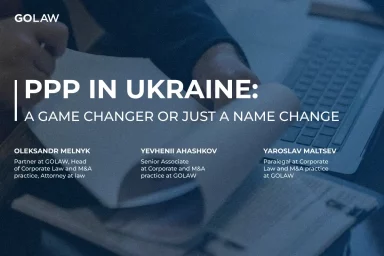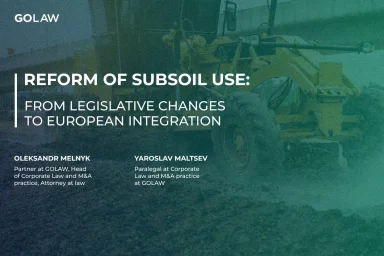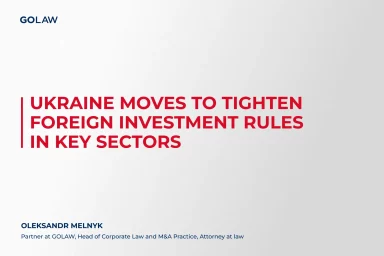“Criminal Liability” of a Legal Entity without a Suspect: Key Business Risks
Contents
- Criminal liability of legal entities in the context of new anti-corruption legislation
- Criminal proceedings under special procedure: grounds and risks
- Criminal law measures against legal entities in cases of bribery “with a foreign element”
- Gaps in the regulation of mechanisms for the procedural participation of a legal entity’s representative and the resolution of procedural issues relating to the enforcement of court decisions
- Conclusions
In its European integration agenda, Ukraine has set itself the ambitious goal of joining the “club of successful countries”, which is the unofficial name of the Organisation for Economic Co-operation and Development (hereinafter referred to as the OECD), which brings together 38 of the world’s most developed economies and is known for setting basic standards of public governance for states that uphold democratic values. In 2022, Ukraine initiated the process of integrating into the OECD and joining its Working Group on Bribery, a crucial step in this process. One of the necessary steps for joining the organisation is the ratification of the OECD Convention on Combating Bribery of Foreign Public Officials in International Business Transactions. Ukraine’s accession to this anti-corruption convention is an integral part of the negotiations on EU accession, which involves aligning domestic regulations with the framework requirements of the partner countries’ criminal legislation, among other things.
Criminal liability of legal entities in the context of new anti-corruption legislation
Traditionally, Ukrainian criminal law recognised only natural persons as subjects of crime. However, after ratifying several international treaties, the state undertook to harmonise national legislation with international standards, in particular regarding the prosecution of legal entities. Since 2013, the Criminal Code of Ukraine (hereinafter – the CC of Ukraine) has contained provisions on criminal law measures against legal entities, providing for the possibility of imposing fines, confiscating property, or liquidating a company in the event of certain crimes being committed by its authorised representative on behalf of and in the interests of such a company.
Law of Ukraine No. 4111-IX of 04.12.2024 supplemented Sections XIV-1 of the CC of Ukraine and VI of the Criminal Procedure Code of Ukraine (hereinafter referred to as the CPC of Ukraine) with the aim of implementing the OECD Convention on Combating Bribery of Foreign Public Officials in International Business Transactions. The law mentioned above introduces additional tools to combat corruption involving foreign officials. On the one hand, the implementation of the OECD Council’s recommendations in this manner is a significant step forward for Ukraine; on the other hand, it poses risks to the business environment that are worth being aware of.
The new provisions potentially expand the scope of liability for legal entities, particularly by allowing for liability without the mandatory simultaneous criminal prosecution of individuals. It creates risks of abuse by pre-trial investigation authorities. Thus, the issue of balancing the effectiveness of anti-corruption control and guarantees of legal certainty for business becomes particularly relevant.
According to the version of the Criminal Code of Ukraine in force until December 2024, criminal law measures could only be applied to a legal entity if there was a fact of a criminal offence committed by an authorised person on its behalf and in its interests. The mandatory criteria in all cases were: 1) conviction of a natural person for one of the crimes provided for in paragraphs 1–6 of Part 1 of Article 96-3 of the Criminal Code of Ukraine; 2) proven connection of this crime with the activities of the legal entity.
Currently, the legislator has deviated from the traditional doctrine, which linked the application of criminal law measures to legal entities with the establishment of the guilt of a natural person. The current CPC of Ukraine has been supplemented by Chapter 37-1, which, along with the general procedure for bringing legal entities to justice, introduces a special procedure, the decisive basis for the application of which is the presence of signs of bribery of foreign officials. In accordance with the new provisions of this procedure, in particular Part 2 of Article 96-3 of the Criminal Code of Ukraine, for the first time, it is possible to apply criminal law measures solely on the basis of the fact of committing a socially dangerous act that falls under the signs of a crime provided for in Articles 209 (legalisation of income), 369 (offer/promise/provision of unlawful benefits), 369-2 (abuse of influence) of the Criminal Code of Ukraine, even without proving the guilt of a specific individual.
The law uses a broader term than criminal offence — “socially dangerous act that falls under the signs of an act provided for in Articles 209, 369, 369-2 of the Criminal Code of Ukraine …”, which allows law enforcement agencies not to prove in court the presence of all elements of a crime (in particular, the identification of a natural person). In our opinion, such a regulation contradicts the principle of presumption of innocence (Article 62 of the Constitution of Ukraine).
Moreover, the provisions of paragraph 6 of part 2 of Article 96-3 of the Criminal Code expressly stipulate that, to apply measures to a legal entity in the event of corruption involving foreign officials, it is not necessary to identify the specific person who committed the act. This construction contravenes the fundamental principles of criminal law, where liability is personal and punishment for an act is only possible if guilt is proven.
It is also worth noting the vagueness and excessive generality of the wording enshrined in both the previous and new provisions of Article 96-3 of the Criminal Code, according to which the basis for bringing a company to justice is the failure of an authorised person to fulfil their duties to take measures to prevent corruption. In the absence of proper regulatory and procedural consolidation of compliance mechanisms, the question arises as to what measures are being referred to. Without precise regulation of the scope, nature, and form of such “compliance control”, business entities may be held liable even in cases where there is no direct link between the actions of an employee and the organisation. In addition, there is no mechanism for the official implementation or monitoring of compliance obligations through independent institutions. It opens the door to selective criminal prosecution and creates additional obstacles to economic activity.
In general, the provisions of Article 96-3 of the Criminal Code of Ukraine, as amended on 4 December 2024, provide an overly broad and vague basis for interpreting the grounds for applying criminal law measures to legal entities. It creates the potential for the unfair use of these measures in the struggle between business competitors. For example, a report to the law enforcement authorities that an authorised representative of a competitor has provided an unlawful benefit to a foreign official may be sufficient grounds for applying criminal law measures against a competing company.
Criminal proceedings under special procedure: grounds and risks
The grounds for criminal proceedings against legal entities under special procedure are rather ambiguous. According to Article 483-1 of the Criminal Procedure Code of Ukraine, criminal proceedings may be conducted under a special procedure (i.e., separately from proceedings against a natural person) on the basis of a prosecutor’s decision or a court ruling. In this case, one of the following conditions must be met:
1) conducting proceedings separately against a legal entity cannot adversely affect the completeness of the pre-trial investigation and court proceedings against a natural person;
2) there is a final conviction, a decision to close criminal proceedings, or the application of medical or educational measures against an authorised representative of the company who acted on its behalf and/or in its interests;
3) the death of the suspect, accused or authorised representative of the company acting on its behalf and/or in its interests, in respect of whom sufficient evidence has been gathered to notify them of suspicion of committing a criminal offence, but who has not been notified of suspicion due to their death;
4) if the pre-trial investigation and/or court proceedings are impossible due to circumstances that effectively prevent the proceedings (in particular, the evasion of the suspect, accused or authorised person who acted on behalf of and/or in the interests of the legal entity from the investigation or court, serious illness of such a person, diplomatic immunity or special legal status of such a person, or refusal of a foreign state to extradite such a person, etc.), provided that this does not adversely affect the completeness and objectivity of the pre-trial investigation and court proceedings in relation to the natural person.
The wording is evaluative in nature, allowing for a broad scope of discretion on the part of the prosecutor. In other words, we see that the prosecutor is effectively allowed to assess, at their own discretion, whether or not the investigation of a natural person will be prejudiced by the conduct of separate criminal proceedings against a legal entity.
Due to the rare application of criminal law measures to legal entities by courts in the past, in particular due to the complexity of proving the connection between the actions of an authorised person and the interests of the company, it can be predicted that decisions on the possibility of conducting separate investigations against legal entities (without the need to establish and prove the guilt of a natural person) will now be popular among prosecutors.
The question arises as to the future practical application of such grounds for criminal proceedings under a special procedure, such as the existence of a decision to close criminal proceedings against an authorised representative of a company who acted on behalf of and/or in the interests of the company. Given the wording of paragraph 2 of part 2 of Article 483-1 and the provisions of paragraphs 1 and 2 of part 1 of Article 284 of the CPC of Ukraine, criminal proceedings against a legal entity are possible even after the closure of a case against an individual due to the absence of a criminal offence or the elements of a crime in their actions. This creates a certain conflict, which allows a legal entity to be held liable even in the absence of a proven crime on the part of a natural person, thereby increasing the risks of abuse and pressure on businesses.
In addition, the provision of paragraph 4 of part 2 of Article 483-1 of the CPC, which equates a person acting on behalf of a legal entity and “evading” the investigation with an accused or suspect, even without official status or a summons to the investigating authority, is controversial. This construction allows a legal entity to be held liable even in so-called “factual” cases.
Criminal law measures against legal entities in cases of bribery “with a foreign element”
Previously, in parallel with the criminal prosecution of a natural person, the following criminal law measures could be applied to a legal entity: fines, confiscation of property, and liquidation.
Currently, this list has been supplemented with additional (non-financial) criminal law measures that may be applied based on the results of criminal proceedings in a special procedure (without establishing the guilt of a natural person). Among the positive aspects, it is worth noting that liquidation and confiscation of a legal entity’s property are not applicable in the above cases. Among the negative aspects is that the duration of the measures may vary from 6 months to 3 years, depending on the court’s decision.
At the same time, Article 96-10-1 of the Criminal Code of Ukraine provides for a relatively long list of non-financial measures, which are divided into two groups: (1) temporary restrictions on the conduct of activities and (2) temporary restrictions on the acquisition of rights and benefits.
Although the new measures are labeled as “non-financial”, their impact can result in significant financial losses and even lead to the shutdown of the business as a whole. For example, restrictions on the use of licences and special permits for the use of subsoil resources for up to 3 years can halt the operation of a business operating in a regulated sector and remove the company from a particular market.
Another problem is that the law of 4 December 2024 does not provide a mechanism for compensating legal entities that may suffer from the illegal or unjustified application of criminal law measures (e.g., in the form of restrictions on participation in tenders or advertising their activities). This creates an imbalance: if a company is unjustifiably held liable, it risks significant reputational, financial, and operational losses without any real possibility of obtaining compensation.
Gaps in the regulation of mechanisms for the procedural participation of a legal entity’s representative and the resolution of procedural issues relating to the enforcement of court decisions
The provision of Article 483-7 of the CPC of Ukraine deserves special attention. It provides for the possibility of considering a motion for temporary restrictions on a legal entity without its participation. At first glance, this appears to be an exception that should only apply in cases where there is a real and proven threat, such as a change in constituent documents, liquidation of the company, or alienation of assets. The idea is clear – to prevent the loss or removal of property that may become evidence or the subject of a future judgment.
However, in practice, this rule opens up a highly vulnerable field to abuse. The investigating judge or court is given too much discretion. They can make decisions without representatives of the company itself, which effectively becomes a hostage to the process, without even having the opportunity to express their position. Moreover, there is an urgent need for legislative regulation of the supervisory authority’s functional role in the implementation of court decisions regarding the application of criminal law measures to legal entities under a special procedure. For example, it is currently unclear how situations involving temporary restrictions on a legal entity’s activities, such as prohibiting it from producing and distributing advertising about its own activities, participating in social dialogue bodies, or engaging in sponsorship, are regulated. Neither the Criminal Enforcement Code of Ukraine nor any other document currently contains provisions that clearly define the powers of such a body in the sphere of control over the implementation of the measures mentioned above, which creates a legal vacuum that needs to be filled urgently, since it became possible to bring a legal entity to justice under a special procedure more than six months ago.
Conclusions
Preventing double standards in criminal law is a key condition for effectively combating corruption. The asymmetry between the regulation of “export” and domestic corruption undermines legal certainty, creates room for abuse, and risks pressure on business. Bringing legal entities to justice without proving the guilt of specific individuals contradicts the principles of subjective guilt and individualisation of responsibility. An effective solution is to integrate mechanisms for the liability of legal entities into a unified criminal law system, supplemented by mandatory compliance programmes and internal controls, which will simultaneously strengthen the rule of law and preserve economic stability.

Igor Glushko
Partner, Head of Criminal Law and White Collar Defence practice, Attorney at law
- Contacts
- 31/33 Kniaziv Ostrozkykh St, Zorianyi Business Center, Kyiv, Ukraine, 01010
- i.glushko@golaw.ua
- +38 044 581 1220
- Recognitions
- The Legal 500 EMEA 2023
Get in touch
To get a consultation, please fill out the form below or call us right away:Sign up to be aware
New achievements are inspired by information. GO further, don’t miss out GOLAW news and legal alerts
Our expertise
-
- Energy and Natural Resources
- Antitrust and Competition
- Banking and Finance
- Compliance, Corporate Governance and Risk Management
- Corporate and M&A
- Criminal and White Collar Defence
- Defense in Anti-corruption procedures and regulations
- Labor and Employment
- Natural Resources and Environment
- Government Relations (GR)
- Insolvency and Corporate Recovery
- Intellectual property
- International trade
- Legal support of business and private Сlients in Germany
- Litigation and dispute resolution
- Private clients
- Real Estate and Construction
- Restructuring, Claims and Recoveries
- Martial Law
- Tax and Customs
-
- Agribusiness
- Aviation
- Chemical industry
- Engineering, Construction and Building Materials
- Natural Resources and Environment
- Financial institutions
- IT and AI
- Industry and manufacturing
- Healthcare industries, Life sciences and Pharmaceuticals
- Media, Entertainment, Sports and Gambling
- Retail, FMCG and E-Commerce
- Transport and Logistics
We use cookies to improve performance of our website and your user experience.
Cookies policy
Cookies settings







